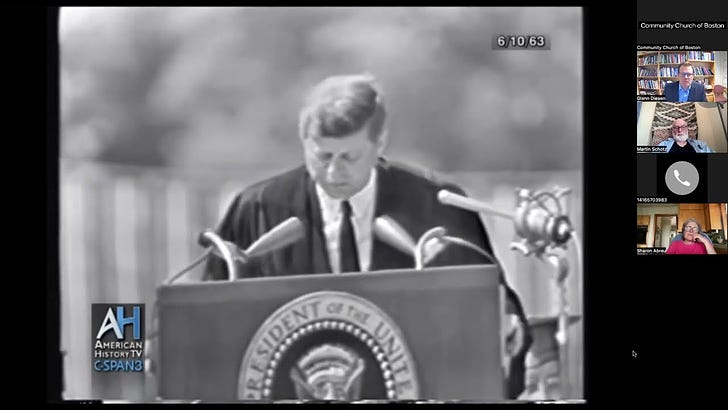I spoke recently at The Community Church of Boston about JFK's famous peace speech from 1963, which was the antidote to the dangerous ideological fundamentalism that George Kennan would later criticise in the 1980s.
My argument was that our ideological fundamentalism dehumanises our adversaries, makes us blind to our own aggressive posture, corrupts the concept of peace, and sets us on a path to war.
Ideological fundamentalism refers to viewing states as enemies based on an assigned negative political identity rather than their actual behaviour in the international system, while presenting oneself as inherently benign due to an assigned positive political identity. George Kennan never used the term ideological fundamentalism, but in 1982 he criticised the US establishment’s posture toward the Soviet Union. The text is perhaps even more relevant today about the oversimplification of reality and dehumanisation of adversaries:
“I find the view of the Soviet Union that prevails today in large portions of our governmental and journalistic establishments so extreme, so subjective, so far removed from what any sober scrutiny of external reality would reveal, that it is not only ineffective, but dangerous as a guide to political action.
This endless series of distortions and oversimplifications; this systematic dehumanization of the leadership of another great country; this routine exaggeration of Moscow’s military capabilities and of the supposed iniquity of Soviet intentions: this monotonous misrepresentation of the nature and the attitudes of another great people — and a long-suffering people at that, sorely tried by the vicissitudes of this past century; this ignoring of their pride, their hopes — yes, even of their illusions (for they have their illusions, just as we have ours, and illusions too, deserve respect); this reckless application of the double standard to the judgment of Soviet conduct and our own, this failure to recognize, finally, the communality of many of their problems and ours as we both move inexorably into the modern technological age: and the corresponding tendency to view all aspects of the relationship in terms of a supposed total and irreconcilable conflict of concerns and of aims; these, believe me, are not the marks of the maturity and discrimination one expects of the diplomacy of a great power; they are the marks of an intellectual primitivism and naivety unpardonable in a great government. I use the word naivety, because there is a naivety of cynicism and suspicion, just as there is a naivety of innocence.
And we shall not be able to turn these things around as they should be turned, on the plane of military and nuclear rivalry, until we learn to correct these childish distortions — until we correct our tendency to see in the Soviet Union only a mirror in which we look for the reflection of our own virtue — until we consent to see there another great people, one of the world’s greatest, in all its complexity and variety, embracing the good with the bad, a people whose life, whose views, whose habits, whose fears and aspirations, whose successes and failures, are the products, just as ours are the products, not of any inherent iniquity but of the relentless discipline of history, tradition, and course in the nunational experience. If we insist on demonizing these Soviet leaders — on viewing them as total and incorrigible enemies, consumed only with their fear and hatred of us and dedicated to nothing other than our destruction — that, in the end, is the way we shall assuredly have them, if for no other reason than that our view of them allows for nothing else, either for them or for us”
President John F. Kennedy similarly cautioned in his peace speech on June 10 1963 that dividing the world into good versus evil undermines constructive dialogue, and instead feeds the logic of war. His comments are especially relevant today as our politicians continue to make great steps towards nuclear war without a diplomatic off-ramp:
“Above all, while defending our own vital interests, nuclear powers must avert those confrontations which bring an adversary to a choice of either a humiliating retreat or a nuclear war. To adopt that kind of course in the nuclear age would be evidence only of the bankruptcy of our policy--or of a collective death-wish for the world”.




Glenn, as usual, is acute and brilliant.
Very true. Unfortunately, perhaps inevitably given the imperfect nature at the core of Humanity, Kennan's wisdom fails to be understood by AmeriKa's deaf, dumb and blind political leaders, no matter which party affiliation.